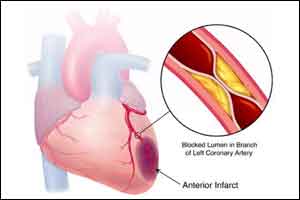- Home
- Editorial
- News
- Practice Guidelines
- Anesthesiology Guidelines
- Cancer Guidelines
- Cardiac Sciences Guidelines
- Critical Care Guidelines
- Dentistry Guidelines
- Dermatology Guidelines
- Diabetes and Endo Guidelines
- Diagnostics Guidelines
- ENT Guidelines
- Featured Practice Guidelines
- Gastroenterology Guidelines
- Geriatrics Guidelines
- Medicine Guidelines
- Nephrology Guidelines
- Neurosciences Guidelines
- Obs and Gynae Guidelines
- Ophthalmology Guidelines
- Orthopaedics Guidelines
- Paediatrics Guidelines
- Psychiatry Guidelines
- Pulmonology Guidelines
- Radiology Guidelines
- Surgery Guidelines
- Urology Guidelines
Varenicline helps MI patients quit smoking in long run : EVITA

Patients who smoke after an acute coronary syndrome, including a myocardial infarction or unstable angina are at increased risk of another attack and death if they do not quit.Varenicline has been shown to be efficacious in stopping smoking in patients with heart attack within the first 6 months, but its longer-term efficacy was not previously known.Researchers from Canada conducted a randomized controlled trial to evaluate the efficacy of varenicline in patients with the acute coronary syndrome to determine whether it would increase smoking abstinence.They found that in patients who have had a heart attack, the drug varenicline significantly reduced smoking during the following year.The results of study have been published in CMAJ (Canadian Medical Association Journal).
About 40% of participants who received varenicline were not smoking at one year, compared with 29% in the placebo group. Reductions in daily cigarette smoking of at least 50% were also higher in the varenicline group (57.8%) compared with the placebo group (49.7%). Rates of adverse events were similar in both groups.
"This suggests that varenicline is safe for use in these patients," writes Dr. Mark Eisenberg, Jewish General Hospital and McGill University, Montreal, Quebec, with coauthors. "However, new strategies for smoking cessation are still needed, given that 60% of smokers who received treatment with varenicline returned to smoking by one year after their acute coronary syndrome."
The authors note that if varenicline was used as routine treatment in smokers after the heart attack, it would reduce smoking in this group by about 10%.
Dr. Robert Reid, University of Ottawa Heart Institute and coauthors write, "Given the powerful effect of smoking cessation on subsequent cardiovascular morbidity and mortality, smoking cessation interventions including counselling and medications [such as varenicline], initiated in the hospital and integrated into post-discharge support, should be standard practice for patients with acute coronary syndrome receiving treatment at hospitals in Canada. Anything less reflects substandard care."
"Smoking abstinence 1 year after acute coronary syndrome: follow-up from a randomized controlled trial of varenicline in patients admitted to hospital" is published March 26, 2018.
blood flowCanadian Medical Association JournalCMAJDr Mark Eisenbergheart-attackmyocardial infarctionplacebosmokingSmoking Cessationunstable anginaVarenicline
Source : CMAJNext Story
NO DATA FOUND

Disclaimer: This site is primarily intended for healthcare professionals. Any content/information on this website does not replace the advice of medical and/or health professionals and should not be construed as medical/diagnostic advice/endorsement or prescription. Use of this site is subject to our terms of use, privacy policy, advertisement policy. © 2020 Minerva Medical Treatment Pvt Ltd